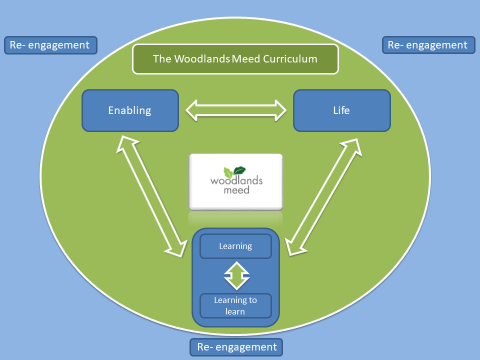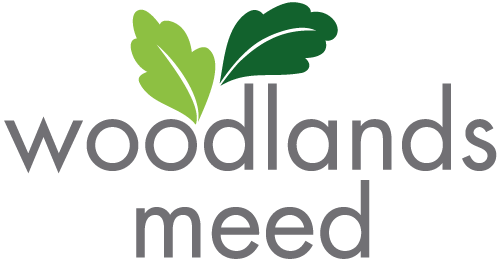Curriculum Strategy
Curriculum Intent
The purpose of the Woodlands Meed curriculum is to enable the pupils to
- Be the best they can be
- Know they belong
- Know they are safe
- Know how to communicate and interact with others
- Value diversity and foster mutual respect
- Develop a love for learning
These values give our pupils the best chance to succeed by becoming well rounded, happy individuals that are ready for the next stage of their lives.
We offer broad learning experiences to provide pupils with the opportunities to gain the relevant skills, knowledge and understanding for a successful future.
Each subject in the curriculum outlines its intent including the relevant knowledge and skills needed for the pupils to progress. The subject leaders from both school and college work in collaboration to ensure sequential learning, whilst meeting the needs of the individual pupils.
Curriculum Implementation
To enable our pupils to achieve, we have 4 curricular areas:
- The Learning and Learning to Learn Curriculum
- The Enabling Curriculum
- The Life Curriculum
- The Re- Engagement Curriculum

The curricular areas take into account the pupils’ stage of development and allows them to move between areas, depending on their prior knowledge and skills.
The Learning and Learning to Learn Curriculum
For those accessing the Learning Curriculum, subject leaders use the West Sussex Key Milestones (for pupils working on pre key stage targets) and the National Curriculum to create specific subject long term plans. They follow a topic or theme that allows the learners to progress their skills with a view to preparing them for the next stage and achieving lifelong learning. Class teams create medium term plans which set out the specific knowledge and skills that will be taught through the topic at differentiated levels, taking into account the pupils’ needs and interests.
For some children who are Learning to Learn, we use an Engagement Curriculum based on ImPACTs, which is a programme developed for those children working below Pre key stage 1 and accessing The Engagement Model.
Learners will have 10 targets based on the following areas:
Communication, early and extended
Cognition, early and extended
Personal Social Emotional and Wellbeing targets promoting self-help and self-advocacy
Physical Development, fine and gross Motor skills.
Environmental Control Technology.
These targets will form their curriculum through:
- The Absolute Curriculum: (daily routines, arrival, hello times, snack, toilet, dinner, goodbye) These are the activities that happen daily and targets are taught through these activities.
- The Essential Curriculum: These activities broaden the experiences of the learners and again targets are taught through these activities. For example, Physio, Hydro, Sensory input, Rebound Tac Pac and PE.
- Desirable Curriculum: A supportive curriculum that compliments the Absolute and Essential curriculum and develops the targets into the wider world. For example, Sensory stories, art, music cooking, community learning, assemblies and whole school events.
The Enabling Curriculum
Our pupils, like most, will often have barriers to learning which can stop them from achieving their best. This area of the curriculum is a holistic approach taking into account the 4 areas highlighted in the pupils EHCP. It ensures the staff are focusing on the pupil’s specific needs to make sure they have the tools to learn and overcome the barriers in their way. This includes interventions, therapy support and class PSHE sessions.
The Life Curriculum
Learners at Woodlands Meed are growing up in a rapidly changing world, full of opportunities but with few guarantees and it is imperative that the curriculum on offer prepares them for life and work in this changing world, whilst boosting their life chances. The ‘Life Curriculum’ helps children and young people to protect themselves and others, improves their physical and emotional health, and develops character, academic attainment and employment prospects. The 7 Skills for Life and Learning have been developed to run alongside the curriculum to help the pupils raise their awareness and how these skills can be developed in the different subject areas.
The Re-Engagement Curriculum
For some pupils with complex social and emotional needs, and difficult childhood experiences, the Learning Curriculum can be inaccessible. These pupils need to develop a feeling of trust and safety in adults and other pupils, and to learn to recognise and manage their feelings in a safe, productive way. Whilst these pupils still access many aspects of the broader National Curriculum, they have many targets and sessions devoted to developing their capacity to feel safe and act safely.
Curriculum Impacts
The teachers at Woodlands Meed keep detailed records of the pupils’ learning using whole school systems. This ensures continuity throughout the school and college, allowing smooth transitions between Key Stages. Our academic and social tracking enables staff to monitor trends and set accurate targets to ensure the pupils are making good and expected progress. The progress is reported in the end of the year report.
Meetings are held regularly throughout the year to encourage pupils, parents and multi-agency groups to discuss both academic and social targets and work is shared via Seesaw to allow the pupil and parents the opportunity to celebrate and review.
Students work towards a range of qualifications outlined in the curriculum offer.
